Choosing the right cryptocurrency exchange is a big decision for your trading journey. BingX and Bitget are popular platforms that offer various trading options, including leverage trading. Many traders compare these exchanges when looking for the best place to buy, sell, and trade digital assets.
When comparing BingX vs Bitget in 2025, you’ll want to examine their fee structures, available cryptocurrencies, trading features, and user experience to determine which platform better suits your needs. Both exchanges have their strengths, with differences in their supported deposit methods, trading types, and overall user ratings that could impact your trading experience.
You might also consider how these platforms stack up against competitors like CoinEx and Bybit. Each exchange offers unique advantages that could make one a better fit for your trading style, whether you’re a beginner or an experienced trader looking for advanced features.
BingX Vs Bitget: At A Glance Comparison
When choosing between BingX and Bitget, it helps to see their key differences side by side. Both platforms serve as cryptocurrency exchanges with special features for traders.
Trading Experience
| Feature | BingX | Bitget |
|---|---|---|
| User Interface | Clean, fast trading experience | Comprehensive, feature-rich |
| Trading Types | Spot, futures, copy trading | Spot, futures, copy trading, more advanced options |
| Mobile App | Available with good ratings | Available with extensive features |
Copy Trading Features
BingX offers a streamlined copy trading experience. It’s known for faster trade execution but provides a lower profit share percentage for traders.
Bitget offers a higher profit share percentage for traders who allow others to copy their strategies. This makes it potentially more rewarding for successful traders.
Fees and Costs
Both exchanges have competitive fee structures. Your trading volume will affect the exact rates you pay. Be sure to check their current fee schedules as these can change.
Security Features
Both platforms implement standard security measures including two-factor authentication and cold storage for funds. Always check their latest security certifications before depositing.
Support Options
BingX and Bitget both offer customer support through multiple channels. Response times may vary, so consider testing their support with a simple question before committing.
Your trading preferences will determine which platform works better for you. Frequent traders might appreciate BingX’s faster experience, while those looking to maximize profit sharing might prefer Bitget.
BingX Vs Bitget: Trading Markets, Products & Leverage Offered
Both BingX and Bitget offer a variety of trading options for crypto enthusiasts in 2025. These platforms have expanded their offerings to meet diverse trading needs.
Trading Markets
BingX and Bitget both support spot trading with hundreds of cryptocurrency pairs. You can trade popular coins like Bitcoin and Ethereum as well as smaller altcoins on either platform.
Leverage Trading
Both exchanges are recognized among the best leverage trading platforms in 2025. Bitget typically offers leverage up to 125x on futures contracts, while BingX provides similar high leverage options.
Available Products:
| Feature | BingX | Bitget |
|---|---|---|
| Spot Trading | ✓ | ✓ |
| Futures | ✓ | ✓ |
| Copy Trading | ✓ | ✓ |
| Options | Limited | ✓ |
| Demo Account | ✓ | ✓ |
BingX has gained popularity for its user-friendly copy trading feature, allowing you to automatically mirror experienced traders’ strategies.
Bitget offers a slightly wider range of derivative products including more developed options trading. This gives you additional ways to speculate on price movements.
Both platforms continually update their product offerings to stay competitive in the crypto exchange market. You’ll find regular additions of new trading pairs and features.
Trading fees vary between the platforms, with both offering tier-based fee structures that reward higher trading volumes with lower costs.
BingX Vs Bitget: Supported Cryptocurrencies
When choosing a crypto exchange, the variety of available cryptocurrencies is crucial for your trading strategy. Both BingX and Bitget offer a wide range of digital assets, but there are some differences worth noting.
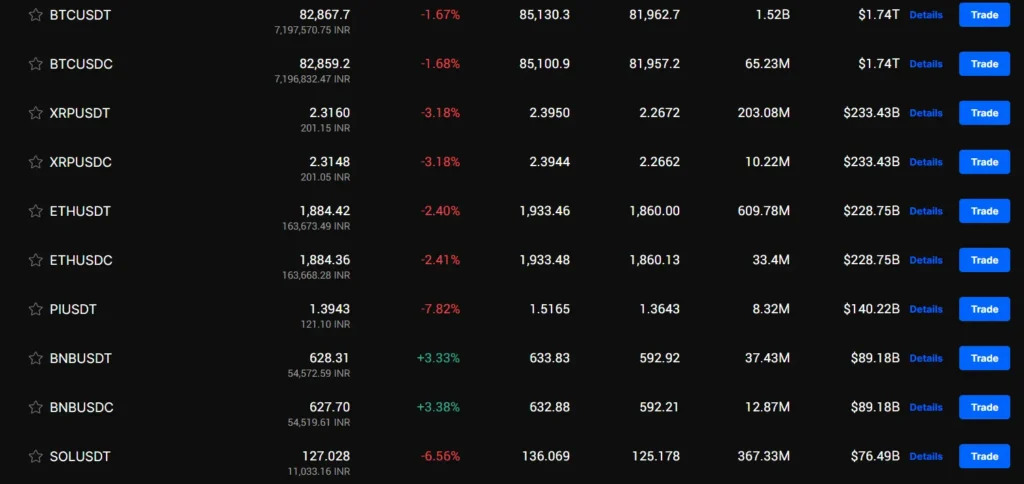
BingX supports over 300 cryptocurrencies for spot trading, including major coins like Bitcoin (BTC), Ethereum (ETH), and popular altcoins. Their selection includes emerging tokens and DeFi projects, giving you access to both established and newer market opportunities.
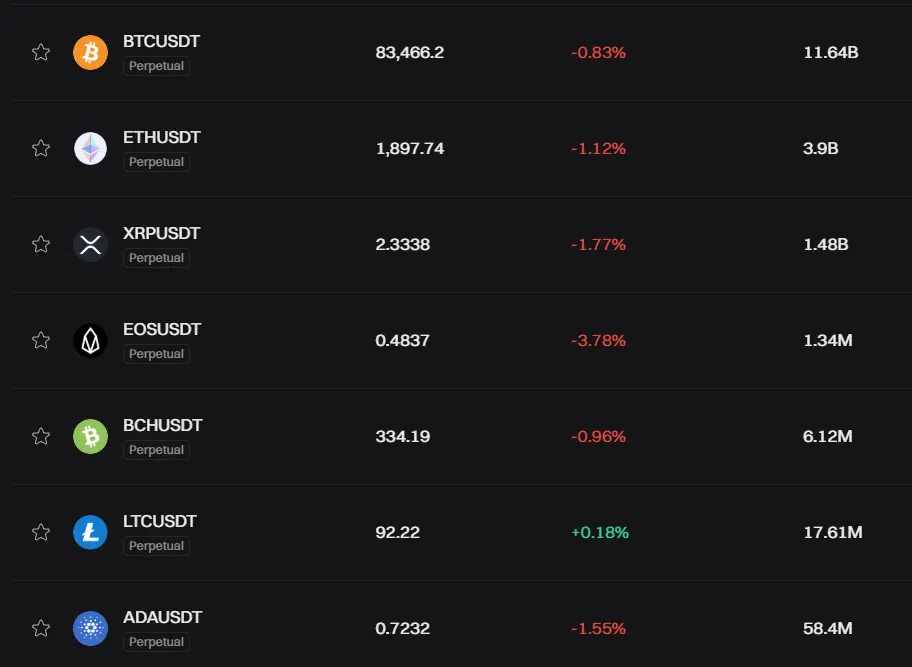
Bitget, meanwhile, offers support for approximately 250+ cryptocurrencies. While this is slightly fewer than BingX, Bitget includes all major cryptocurrencies and many popular altcoins in their lineup.
Main cryptocurrencies supported by both platforms:
- Bitcoin (BTC)
- Ethereum (ETH)
- Ripple (XRP)
- Cardano (ADA)
- Solana (SOL)
- Dogecoin (DOGE)
Both exchanges regularly add new tokens to their platforms. If you’re interested in trading specific altcoins, it’s worth checking their current listings as they frequently update their offerings.
For derivative traders, both platforms provide futures trading for major cryptocurrencies. BingX offers copy trading capabilities across many of their supported coins, which might appeal if you’re looking to follow successful traders.
Bitget has particularly strong offerings in futures trading pairs, which might be advantageous if you focus on leveraged trading strategies.
BingX Vs Bitget: Trading Fee & Deposit/Withdrawal Fee Compared
When choosing between BingX and Bitget, understanding their fee structures is crucial for your trading decisions.
Trading Fees
| Exchange | Spot Trading | Futures (Maker) | Futures (Taker) |
|---|---|---|---|
| BingX | 0.1% | 0.02% | 0.04% |
| Bitget | Varies | Varies | Varies |
BingX maintains a straightforward 0.1% fee for spot trading. For futures trading, BingX charges 0.02% for makers and 0.04% for takers.
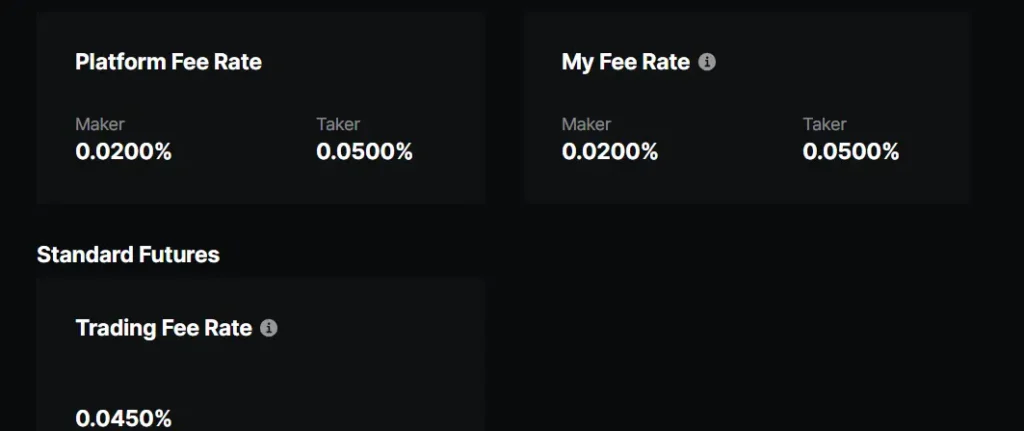
Bitget’s trading fee structure varies based on your trading volume and account level. The exchange offers competitive rates that may be lower for high-volume traders.
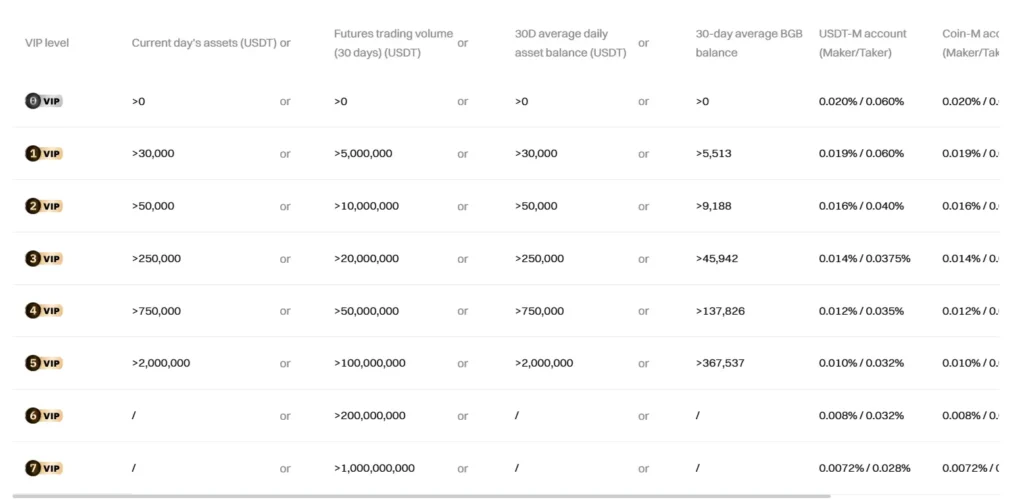
Withdrawal Fees
Both exchanges charge withdrawal fees that vary depending on the cryptocurrency you’re withdrawing. These fees are set to cover network transaction costs.
You should check each platform’s current fee schedule before making large withdrawals, as these can significantly impact your overall trading profits.
Deposit Methods
BingX and Bitget support various deposit methods including cryptocurrency transfers. The availability of fiat deposit options may differ between the two platforms.
Neither exchange charges fees for deposits, making it easy to fund your account without additional costs.
BingX Vs Bitget: Order Types
Both BingX and Bitget offer various order types to help you trade effectively. Understanding these options can improve your trading strategy.
BingX Order Types:
- Market Orders
- Limit Orders
- Stop-Limit Orders
- Take Profit Orders
- One-Cancels-Other (OCO) Orders
BingX provides a user-friendly interface that makes placing these orders simple. Their platform supports both basic and advanced order types for different trading needs.
Bitget Order Types:
- Market Orders
- Limit Orders
- Stop Orders
- Take Profit Orders
- Trailing Stop Orders
Bitget has a slight edge with their trailing stop feature, which automatically adjusts your stop price as the market moves. This can be useful for maximizing profits in volatile markets.
Both exchanges support conditional orders, allowing you to set specific triggers for entry and exit points. This gives you more control over your trading strategy without needing to monitor the market constantly.
For futures trading, both platforms offer additional order types like reduce-only orders and post-only orders. These specialized options help you manage risk in leveraged positions.
The mobile apps for both exchanges include all major order types, so you can trade with full functionality on the go. The interfaces are designed to make complex orders accessible even on smaller screens.
BingX Vs Bitget: KYC Requirements & KYC Limits
Both BingX and Bitget require Know Your Customer (KYC) verification, but they differ in their approach and limitations.
BingX offers minimal KYC options for certain transactions, making it easier for new users to start trading quickly. For users without KYC verification, BingX allows a daily withdrawal limit of 50,000 USDT.
Bitget mandates KYC for all users regardless of transaction size. Once you complete the verification process on Bitget, there are no limitations on your account activities.
KYC Requirements Comparison:
| Exchange | KYC Mandatory | Verification Speed |
|---|---|---|
| BingX | Partial | Quick process |
| Bitget | Full | Standard process |
When using Bitget’s copy trading feature, additional requirements apply. You must complete KYC verification and ensure your contracts have:
- No open orders
- No active positions
- No stop limits set
- No traders being followed
The KYC process for both platforms typically requires your personal information and identity documents. This security measure helps protect your assets and complies with financial regulations.
Your choice between these platforms may depend on how quickly you want to start trading and your comfort level with providing personal information.
BingX Vs Bitget: Deposits & Withdrawal Options
Both BingX and Bitget offer several methods to deposit and withdraw funds, but they have some key differences worth noting.
Deposit Methods:
- BingX: Supports cryptocurrency deposits, bank transfers, and limited credit/debit card options
- Bitget: Offers cryptocurrency deposits, bank transfers, credit/debit cards, and some regional payment methods
Withdrawal Options:
| Feature | BingX | Bitget |
|---|---|---|
| Crypto withdrawals | Yes | Yes |
| Fiat withdrawals | Limited | More options |
| Processing time | 24-48 hours | 1-24 hours |
Bitget typically processes withdrawals faster than BingX, which can be important when you need quick access to your funds.
The withdrawal fees vary between the platforms. BingX charges fixed fees for most cryptocurrencies, while Bitget’s fee structure is generally competitive but varies by asset.
Both exchanges implement security measures for withdrawals, including email confirmations and two-factor authentication. You should always enable these security features to protect your funds.
For European users, both platforms provide regulated services, though the specific deposit and withdrawal methods may vary based on your country of residence.
Remember to verify the current deposit and withdrawal options directly on each platform, as they frequently update their available methods and fee structures.
BingX Vs Bitget: Trading & Platform Experience Comparison
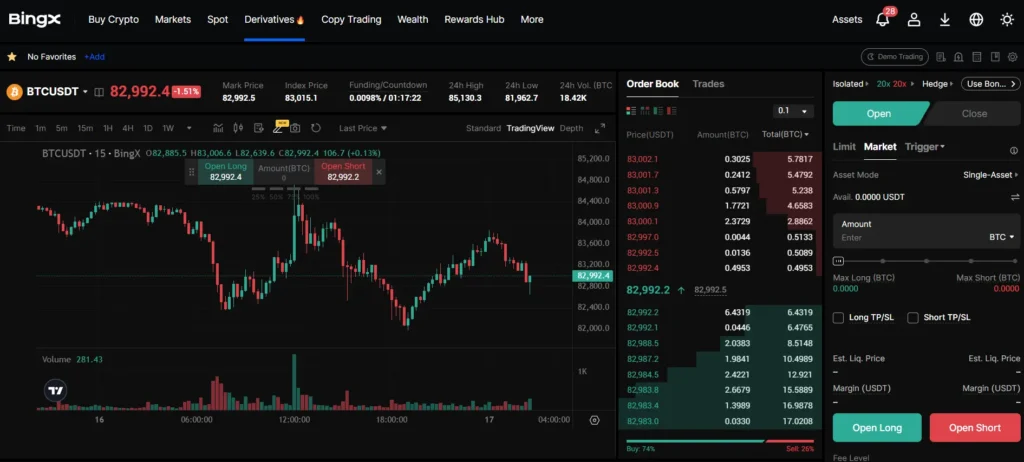
When choosing between BingX and Bitget, the trading platform experience is a key factor to consider. Both exchanges offer leverage trading but with different user experiences.
User Interface
- BingX offers a clean, intuitive interface that’s easier for beginners
- Bitget provides a more data-rich environment that experienced traders may prefer
- Both platforms have mobile apps with similar functionality to their web versions
Bitget typically offers more advanced charting tools, which can help you analyze market trends better. However, BingX has a simpler layout that won’t overwhelm you if you’re just starting out.
Trading Features
| Feature | BingX | Bitget |
|---|---|---|
| Leverage | Up to 100x | Up to 125x |
| Order Types | Market, Limit, Stop | Market, Limit, Stop, OCO |
| Copy Trading | Yes (prominent feature) | Yes |
| Demo Account | Available | Available |
BingX stands out with its copy trading system, allowing you to follow successful traders easily. This feature is especially useful if you’re new to cryptocurrency trading.
Bitget’s slightly higher leverage options give you more flexibility for margin trading, but this comes with increased risk. Both platforms offer demo accounts where you can practice trading strategies without risking real money.
The trading fees are competitive on both platforms, though they vary based on your trading volume and VIP level. You’ll find the execution speed is reliable on both exchanges during normal market conditions.
BingX Vs Bitget: Liquidation Mechanism
When trading with leverage on crypto exchanges, understanding the liquidation mechanism is crucial for your risk management. Both BingX and Bitget have systems in place to protect themselves when your positions approach dangerous loss levels.
BingX uses a tiered liquidation system that sends warnings as your margin ratio decreases. You’ll typically receive alerts when your position reaches 80% of your margin, giving you time to add funds or reduce your position size.
Bitget employs a similar warning system but includes a partial liquidation option on some trading pairs. This allows the platform to close only a portion of your position to bring your margin ratio back to safer levels.
Key differences in liquidation approaches:
| Feature | BingX | Bitget |
|---|---|---|
| Warning notifications | Yes | Yes |
| Partial liquidation | Limited | More widely available |
| Liquidation price transparency | Good | Very good |
| Liquidation fee | 0.5-1% | 0.5-0.8% |
Both platforms calculate your liquidation price based on your position size, leverage used, and available margin. However, Bitget offers slightly more detailed information about this process in their trading interface.
You should familiarize yourself with each platform’s specific liquidation formulas before trading with high leverage. This information can typically be found in their help centers or trading rules sections.
Neither exchange offers complete liquidation protection, so proper position sizing and stop-loss orders remain your best defense against unexpected market movements.
BingX Vs Bitget: Insurance
When trading on cryptocurrency exchanges, insurance is a key safety feature you should consider. Both BingX and Bitget offer insurance protection, but with different approaches.
BingX Insurance Features:
- Maintains a user protection fund for potential security breaches
- Offers up to $130 million in insurance coverage
- Protection primarily focused on platform security incidents
Bitget Insurance Features:
- Provides a Protection Fund worth over $300 million
- Offers 20% margin for spot trading insurance
- Includes specific coverage for copy trading activities
Bitget’s insurance fund is significantly larger, giving you more potential coverage in case of security issues. This can be important when deciding where to place larger investments.
Both platforms use these insurance systems to protect against hacks, technical failures, and other unexpected events. Neither fully covers losses from personal trading decisions or market movements.
When comparing insurance policies, check the fine print about what triggers a claim. Bitget appears to offer more detailed coverage for different trading types.
You should also verify if the insurance applies to all account levels and trading products. Some protections may only activate after specific verification tiers or for certain trading pairs.
Insurance isn’t the only safety factor to consider, but it represents each platform’s commitment to user security and risk management.
BingX Vs Bitget: Customer Support
When choosing a cryptocurrency exchange, customer support quality can make a big difference in your trading experience. Both BingX and Bitget offer support services, but there are some differences worth noting.
BingX provides customer support through multiple channels including live chat, email, and social media. Their response times are generally reasonable, though some users report occasional delays during peak trading periods.
Bitget offers 24/7 customer support as mentioned in the search results. This round-the-clock availability can be crucial when you encounter issues during off-hours or weekends when trading volatility often increases.
Both platforms offer help centers with FAQs and guides to answer common questions. These self-service resources can help you solve basic problems without needing to contact support directly.
Response quality varies between the two platforms. Bitget’s support team is often praised for technical knowledge, while BingX receives positive feedback for clear communication in multiple languages.
For new users, Bitget’s support team seems to provide more beginner-friendly guidance. BingX support tends to excel when handling more complex trading questions and account issues.
When it comes to issue resolution speed, both platforms typically resolve simple problems within hours. More complex issues might take 1-2 business days on either platform.
Neither platform currently offers phone support, which might be important if you prefer direct verbal communication for urgent matters.
BingX Vs Bitget: Security Features
When choosing a crypto exchange, security should be your top priority. Both BingX and Bitget offer robust security features to protect your assets.
BingX implements two-factor authentication (2FA) to add an extra layer of protection to your account. They also use cold storage for most crypto assets, keeping them offline and safe from hackers.
Bitget similarly offers 2FA but enhances security with advanced encryption technology. Their platform includes regular security audits to identify and fix potential vulnerabilities before they become problems.
Key Security Features Comparison:
| Feature | BingX | Bitget |
|---|---|---|
| Two-Factor Authentication | ✓ | ✓ |
| Cold Storage | ✓ | ✓ |
| Insurance Fund | Limited | $300M+ |
| KYC Verification | Required | Required |
| Anti-phishing Code | ✓ | ✓ |
| IP Whitelisting | ✓ | ✓ |
Bitget stands out with its larger insurance fund, which provides more coverage in case of security breaches. This fund exceeds $300 million, offering you additional peace of mind.
BingX focuses on real-time monitoring systems that track unusual account activities. You’ll receive immediate alerts if suspicious actions are detected on your account.
Both platforms require KYC (Know Your Customer) verification to comply with regulations and prevent fraud. This helps protect not only your assets but the entire platform ecosystem.
Remember to always enable all available security features when you create your account on either platform. This significantly reduces the risk of unauthorized access to your funds.
Is BingX A Safe & Legal To Use?
BingX appears to be a legitimate cryptocurrency exchange based on current information. Established in 2018, the platform has grown to serve over a million users globally.
From a regulatory standpoint, BingX is considered a regulated platform. This adds a layer of consumer protection that unregulated exchanges cannot offer.
The exchange has not experienced any major security breaches or significant losses of user funds based on available information. This track record contributes to its reputation for security.
One of BingX’s standout features is its copy trading functionality, which allows you to automatically mirror the trades of successful traders. This feature makes it particularly appealing if you’re new to cryptocurrency trading.
Key safety factors for BingX:
- Regulated exchange
- Operating since 2018
- No major security incidents reported
- Over 1 million active users
Before creating an account, you should verify that BingX is available and compliant with regulations in your specific country or region. Cryptocurrency regulations vary widely around the world.
It’s also wise to enable all available security features if you choose to use BingX. This includes two-factor authentication (2FA) and any additional verification steps to protect your assets.
Is Bitget A Safe & Legal To Use?
Bitget is generally considered safe and legal for cryptocurrency trading. The exchange has not experienced significant security breaches or losses of user funds according to current information.
Bitget has obtained proper regulatory registrations in European countries like Lithuania and Poland as a crypto service provider. This legal compliance adds a layer of legitimacy to the platform.
For security, Bitget implements several protective measures to safeguard your assets. These include two-factor authentication (2FA) and cold storage solutions for keeping funds secure offline.
User feedback about Bitget’s security is mostly positive, though some users have expressed concerns in reviews. It’s always wise to conduct your own research before using any exchange.
The platform is fully licensed, which means they’ve completed necessary regulatory processes to ensure security standards are met. This helps protect you as a user when trading on their platform.
Key security features on Bitget:
- Two-factor authentication
- Cold storage for funds
- Regulatory compliance
- No major security incidents reported
When using Bitget, always enable all available security features and follow best practices for crypto trading to maximize your protection.
Frequently Asked Questions
Trading platforms differ in several key aspects that impact your trading experience. These differences include fees, available markets, security measures, and support options that can influence your choice between BingX and Bitget.
What are the differences in trading fees between BingX and Bitget?
BingX charges maker fees ranging from 0.02% to 0.15% and taker fees from 0.04% to 0.20%, depending on your trading volume. These fees vary based on your VIP level.
Bitget’s fee structure is slightly different with maker fees from 0.01% to 0.10% and taker fees from 0.03% to 0.15%. Both platforms offer fee discounts for users who hold their native tokens.
BingX tends to have higher fees for new traders, while Bitget may offer better rates for high-volume traders.
Can users from the United States trade on Bitget?
No, Bitget does not currently allow users from the United States to trade on their platform due to regulatory restrictions. This is clearly stated in their terms of service.
BingX also restricts US users for similar regulatory reasons. If you’re based in the US, you’ll need to explore alternative exchanges that comply with US regulations.
Which platform, BingX or Bitget, offers more diverse trading pairs or financial products?
Bitget offers over 500 trading pairs across spot, futures, and margin trading. They’re particularly known for their strong selection of altcoins and innovative DeFi tokens.
BingX provides around 300+ trading pairs, with a focus on popular cryptocurrencies. Bitget generally has a wider selection of assets and trading options, including more advanced derivatives products.
Both platforms offer copy trading, but Bitget’s offering is more robust with a larger selection of traders to follow.
What regulatory compliance measures do BingX and Bitget have in place?
Bitget holds licenses in Australia, Canada, and several other jurisdictions. They’ve implemented KYC procedures and anti-money laundering policies that comply with international standards.
BingX operates with compliance in various regions including Europe and Asia. Both exchanges regularly update their compliance measures to adapt to changing regulations in the cryptocurrency space.
Neither platform is fully regulated in all jurisdictions, so you should verify their regulatory status in your specific location.
How do the security features of BingX compare to those of Bitget?
Bitget employs multi-signature wallets, cold storage for the majority of funds, and two-factor authentication. They also maintain an insurance fund to protect users against potential losses.
BingX implements similar security features including cold storage solutions and mandatory 2FA. Both platforms conduct regular security audits to identify vulnerabilities.
Neither exchange has reported major security breaches recently, but Bitget’s larger insurance fund might provide additional peace of mind for traders concerned about security.
What customer support services do BingX and Bitget provide to their users?
Bitget offers 24/7 customer support through live chat, email, and support tickets. Their response times typically range from a few minutes to several hours depending on inquiry complexity.
BingX provides multilingual support through similar channels but may have slightly longer response times during peak periods. Both platforms maintain comprehensive help centers with guides and FAQs.
Bitget’s customer support is generally rated higher by users, particularly for handling complex trading issues and account-related problems.
Bitget Vs BingX Conclusion: Why Not Use Both?
After comparing Bitget and BingX, you might wonder which platform to choose. The truth is, you don’t always need to pick just one.
Bitget offers strong features for advanced traders. Its leverage trading options and variety of trading tools make it attractive if you’re looking to use more complex strategies.
BingX, on the other hand, provides a faster, more user-friendly experience. It’s especially good for beginners who want a simpler interface while learning the crypto world.
You can use Bitget for its advanced trading features and BingX for its speed and simplicity. This combination gives you the best of both worlds.
Many traders maintain accounts on multiple exchanges to:
- Take advantage of different fee structures
- Access unique coins and trading pairs
- Test different copy trading systems
- Spread risk across platforms
Both platforms are regulated, which adds a layer of security to your trading. You can start with the platform that matches your current skill level.
As you grow in experience, you might find value in using both exchanges for different purposes. BingX might be your go-to for quick trades, while Bitget could serve your more complex trading needs.
Remember to start small on any new platform and gradually increase your trading as you become more comfortable with the interface and features.
